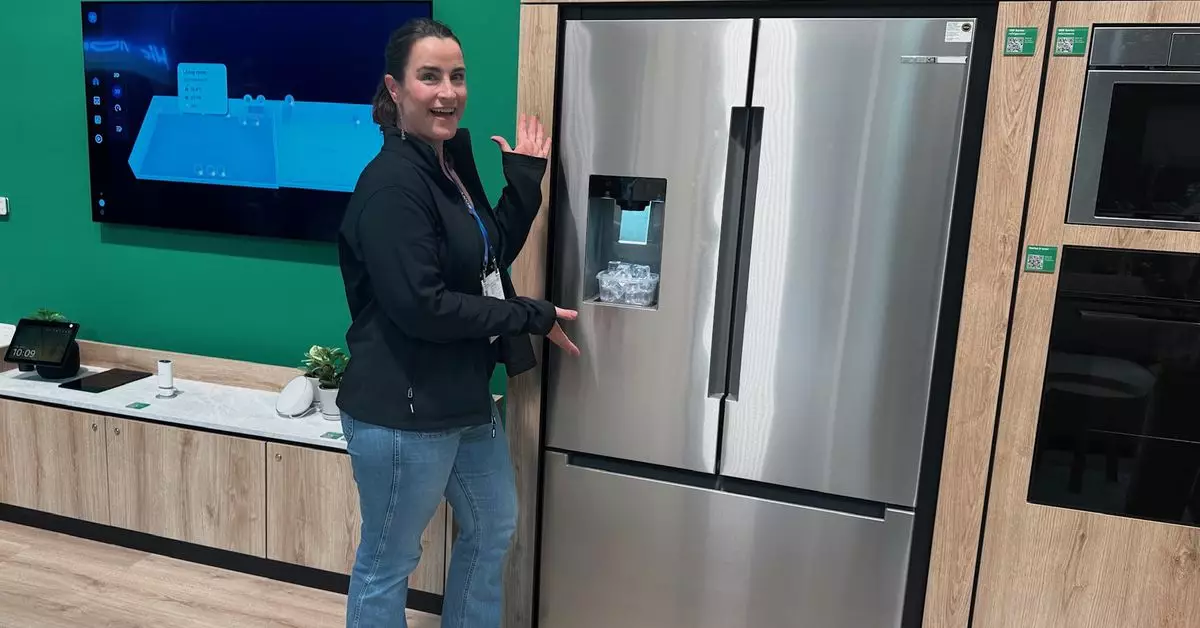In the rapidly evolving landscape of smart home technology, interoperability is key. The emergence of the Matter standard, designed to foster seamless communication between connected devices, marks a transformative shift in how consumers interact with their appliances. As major players like Bosch begin to adopt this standard, the potential for enhanced connectivity and user experience in home devices is significant. This article delves into Bosch’s latest offering in this space, the 100 Series French Door Bottom Mount Refrigerator, and its implications for the smart appliance market.
Introducing Bosch’s 100 Series Refrigerator
During the recent CES event, Bosch unveiled its first Matter-enabled appliance, the 100 Series French Door Bottom Mount Refrigerator, which is set to hit the US market this spring at a retail price of $2,500. Positioned as a cutting-edge appliance, the refrigerator features onboard technology that supports Matter, unlocking a host of new functionalities for users. Available to consumers later this year, the model aims to enhance kitchen efficiency while simplifying the integration of smart home systems.
The 100 Series Refrigerator is not just a standalone product; it is part of a larger strategy by BSH, the parent company of Bosch, Siemens, Thermador, and Gaggenau, to expand Matter compatibility across its range of appliances. According to Eelco Lammertink from BSH, the plan is to progressively incorporate Matter functionality, beginning with refrigerators and potentially expanding to additional appliance categories in the coming years.
Bosch’s 100 Series Refrigerator supports Matter 1.3, allowing users to remotely manage temperature settings and receive notifications via their preferred smart home platform. For instance, users can set up alerts to be notified if the refrigerator door is left ajar, turning the appliance into a more responsive element of the household. This local connectivity not only increases speed and efficiency but also enhances security compared to traditional cloud-based systems.
While features such as temperature control and notifications are becoming commonplace among smart refrigerators, the integration with Matter elevates these functionalities by ensuring robust local communication. Currently, Samsung SmartThings and Home Assistant are the only platforms supporting appliance functionality under Matter; however, Lammertink mentioned that Amazon is expected to integrate Matter compatibility later this year. The absence of Google Home or Apple Home support is still a focal point for potential users who might find themselves concerned about compatibility with their existing smart ecosystems.
One of the most exciting prospects of Matter integration is its potential role in energy management. Lammertink indicated that Bosch plans to incorporate energy reporting and management capabilities into its refrigerators, allowing users to monitor their energy consumption and incorporate their appliances into a holistic Matter-enabled home energy management system. This alignment not only benefits users through cost efficiency but also aligns with broader sustainability goals.
Nevertheless, it is important to note that existing Bosch appliances will not receive updates to support Matter. Lammertink cited significant technical challenges involved in retrofitting appliances with this advanced connectivity, pointing to the risks of potentially “bricking” older devices like Thermador ranges or dishwashers. This decision may disappoint current Bosch appliance owners but underscores the complexities of integrating new technologies with legacy products.
Matter represents a significant advancement in the realm of smart home technology. As an open-source, IP-based connectivity standard developed by industry giants like Apple, Amazon, Google, and Samsung, it promises to simplify user experiences across myriad smart devices, allowing for seamless setup and multi-admin control across platforms.
However, as exciting as these developments are, challenges remain. Ensuring widespread compatibility and consumer trust in new technologies will be crucial as companies navigate the transition toward more interconnected homes. With Bosch’s strategic commitment to adopting Matter, the company is poised to play an important role in this transformative phase of the smart home.
Bosch’s 100 Series Refrigerator represents more than just a step into the world of Matter-enabled appliances; it signifies a pivotal moment in the evolution of home technology. By prioritizing local connectivity, energy management, and user-friendly features, Bosch is setting a standard for the next generation of smart home appliances. As the landscape continues to evolve, the implications for consumer convenience and energy efficiency may well be profound.

